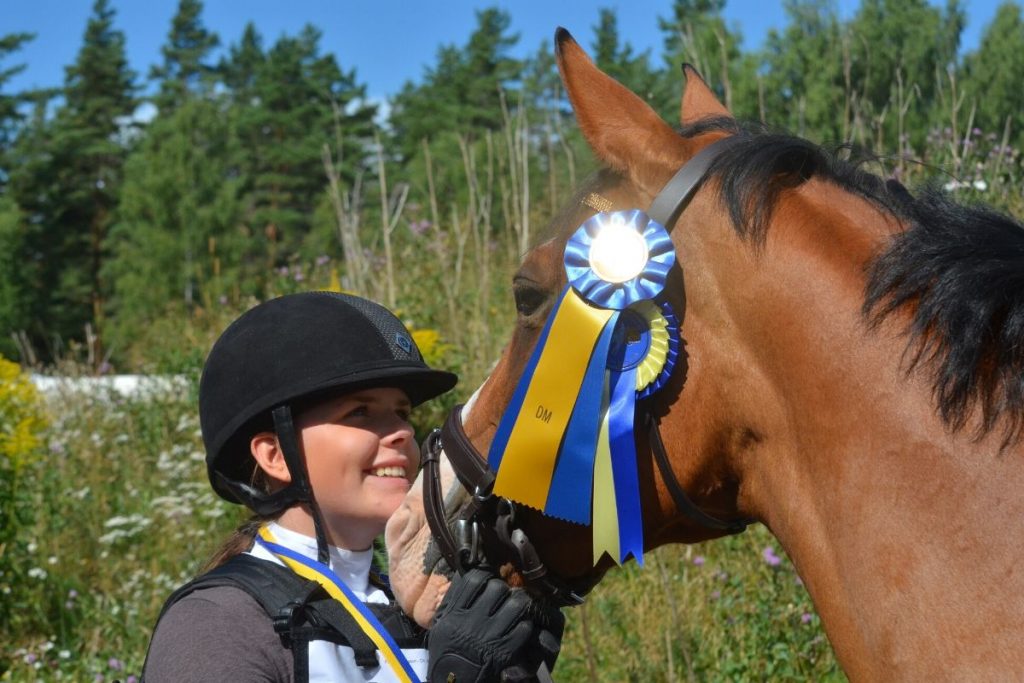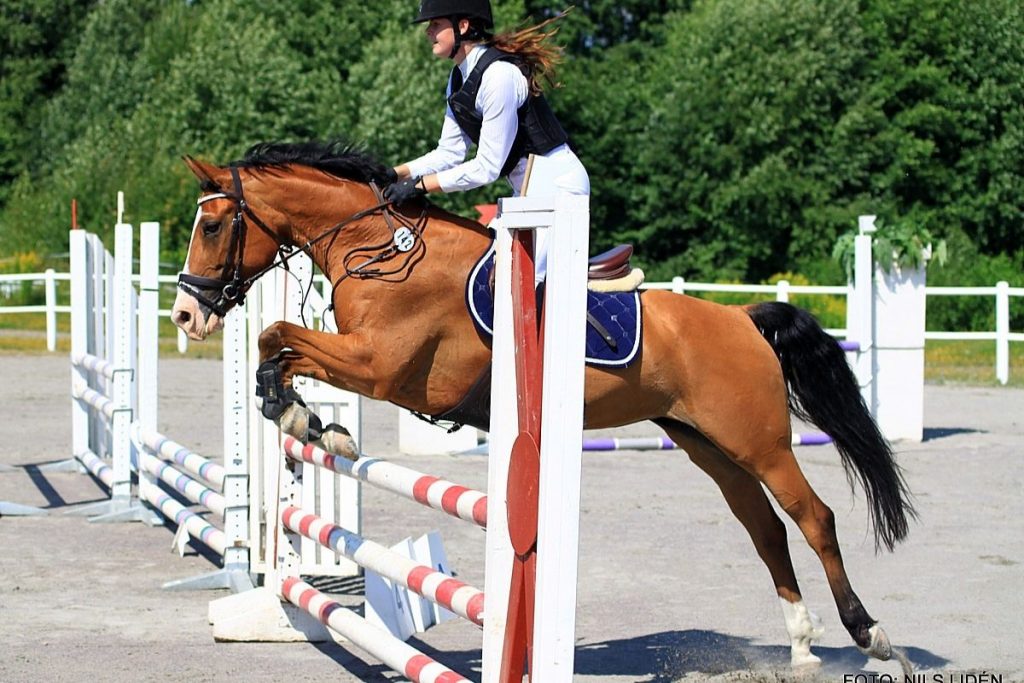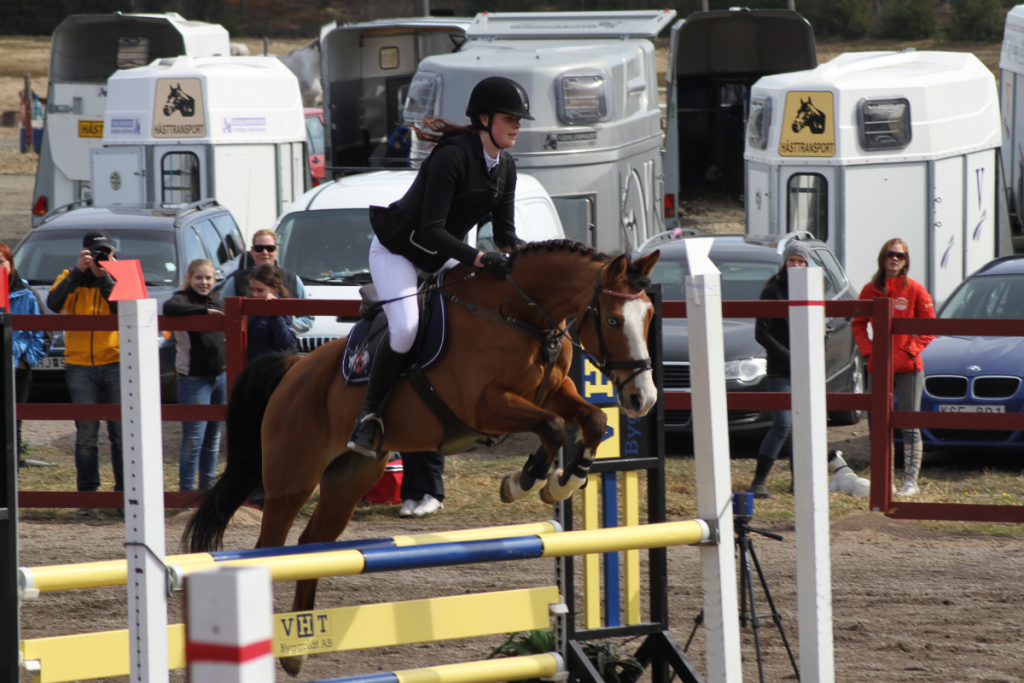If you’ve undergone the process of learning how to ride a bike with the guidance of your parents, I’m sure they have given you more than enough examples of what could go wrong when you don’t wear a helmet. Compared to a horse, a bike is small, controllable and predictable. Even the calmest and friendliest horse can be startled by the most unexpected things.
This leads us to the question at hand.
Can you ride a horse without wearing a helmet? Yes, as an adult rider you can ride a horse without a helmet but you shouldn’t. Horses can react strongly to things in the surrounding environment which will cause the rider to have a hard time keeping control of the horse. If the rider is thrown off, rushed against a fence or a wall, the risk of injury is much greater without a helmet.

I’ve been asked this question more than once in my life and I’ve always asked myself why anyone would want to ride without a helmet. When the accident happens, you’ll be glad you wore one. In addition to that, these helmets look way better than the ones I used to wear when I rode my bike.
With that said, I’ve heard of riders who get pretty bad headaches by wearing helmets and others who believe they will be penalized during shows by wearing helmets. Yes, these things are frustrating but they still don’t justify not wearing a helmet.
In this article, we’ll discuss the topic – continue reading to find out more about the laws and risks regarding helmets, how often you should get a new helmet and why some riders have decided that they don’t need one.
Can You Really Ride a Horse Without a Helmet?
While it is far from recommended, it can be done and it is done on a regular basis by both novice and experienced equestrians.
Some riders are more fond of their safety than others. The more experienced you get, you either become more aware of the risks and apply the safety measures you believe in or you become more confident in your ability to control the horse and as a result, you stop applying said safety measures.
No matter how experienced you are as a rider, no matter how well you know your horse or the surrounding terrain, you should still wear a helmet. Horses are animals with instincts and they will act differently when they are put in new situations.
Loud sounds, such as a car horn, a dog’s bark, or a telephone ringing may cause your horse to panic. Wasps, wolves, rabbits and other wild animals in your region may appear out of nowhere when you’re riding.
How will the horse act? You can never know.
Is It Legal To Ride a Horse Without a Helmet?

As an adult, you can ride a horse without a helmet legally, but as a minor, you need to wear a helmet while you’re out on public highways and byways. This is stated in Highway Code Rule 49.
Rule 49 Horse riders
Safety equipment: children under the age of 14 must wear a helmet that complies with the Regulations. It must be fastened securely. Other riders should also follow these requirements. These requirements do not apply to a child who is a follower of the Sikh religion while wearing a turban.
BHS
In addition to that, a rider may get a reduced compensation if he or she makes a claim as a result of an injury when out riding. If the insurance company agrees that the injury could have been prevented or minimized by wearing a helmet, the rider’s compensation will be reduced.
It’s important to keep in mind that these laws may not be the same in your region. In the UK it’s required to wear a helmet up until the age of 16, no matter the circumstances. In Ireland, you have to wear your helmet until the age of 16 and if you’re riding cross country you’re also required to wear your body protector.
In the United States, laws regarding helmets will differ depending on what state you reside in. You can read more about the specific laws here.
Do You Have To Wear a Riding Helmet When You Compete?
It’s a very broad question, not only because the equestrian competition-scene is broad itself but also because there are different classes, different regions, different federations and so forth.
Competitions that mandate helmets may also have strict requirements on the helmet – these requirements are called standards. Using standards is a simple way to quality control helmets and regulate which ones are safe to use during competitions.
If your helmet meets any standards, you can find them on the label inside the helmet. If you haven’t replaced your helmet in a while, you may have to purchase a new one simply because the old one doesn’t meet the new standards. Be sure to check what type of certification a helmet needs in your region or for a certain competition.
In 2011, the US Equestrian Federation made it mandatory for riders to wear approved helmets when mounted at national dressage and eventing competitions.
The following is also true for the US;
If you’re younger than 18, you must wear a helmet that meets the ASTM/SEI standards at any national or international dressage level – no matter if you’re competing or not. If you’re 18 or older and only compete in FEI dressage levels or tests, you’re not obligated to wear a helmet that meets the standards.
But because there are riders all over the world competing for a bunch of different federations, it’s quite hard to tell. I do recommend that you find out which federation governs the horse-riding standards and rules in your region and visit their website to gather more information.

How Much Does a Riding Helmet Cost?
You can find high-quality, ASTM-certified helmets for as little as 40-50$ online. That’s not enough money to justify not purchasing one.
To wear or not to wear a helmet should really be a no-brainer. You shouldn’t have to think about it. No matter the circumstances. As an equestrian, you will most likely fall off your horse several times – even as an experienced rider. The damage caused by the fall could be fatal, in the worst case.
If not, it can cause some serious damage to your brain. There’s not much to debate if you ask me. Something tells me that anyone who’s responsible for themselves and the safety of others would agree. There’s very little that speaks against wearing a helmet.
Not even the price…
How Often Should You Get a New Riding Helmet?
There are several guidelines regarding the lifespan of a riding helmet. The first and most important rule of thumb is to replace your helmet if you fall off the horse and the helmet is damaged by the fall. Using a helmet that has been struck or is damaged is dangerous.
Apart from that, a riding helmet should also be replaced when:
- It has been used for five to six years. This is only if the helmet hasn’t been damaged or torn down.
- The helmet has been exposed to extreme temperatures or great amounts of chemicals which tear the helmet’s material down.
- If it is dropped on the ground and lands on sharp or hard objects.
Remember, a helmet may look like it’s in pristine condition on the outside but the inside may be torn down and its effectiveness may be reduced substantially.
Damaged helmets aren’t reliable and should, therefore, be replaced as quickly as possible.
But what happens to a helmet when it’s dropped or smashed against the ground?
The shock-absorbing foam inside the helmet’s liner will crack if the force of the impact is strong enough. Once the foam has crushed or cracked, the helm won’t be as strong and will, from then on, provide less protection. If the helmet experiences another impact when the shock-absorbing foam is damaged, the helmet may not be able to protect the rider well.
So, Why Do Some Equestrians Skip Out On Wearing Helmets?
There are a bunch of reasons why some riders have decided to skip out on wearing helmets. Some are bothered by the headaches that helmets can produce while others don’t feel comfortable and fashionable wearing a helmet. I believe there’s no reason good enough to justify not wearing a helmet.
The most common reasons include:
- They are willing to gamble.
- They have practiced safety dismounts and will rely solely upon those maneuvers if an accident occurs.
- Their helmet causes headaches.
- Wearing a helmet makes their hair messy.
- That specific helm isn’t very comfortable.
- That specific helm isn’t very good looking.
- They are experienced riders.
- Helmets cost money.
